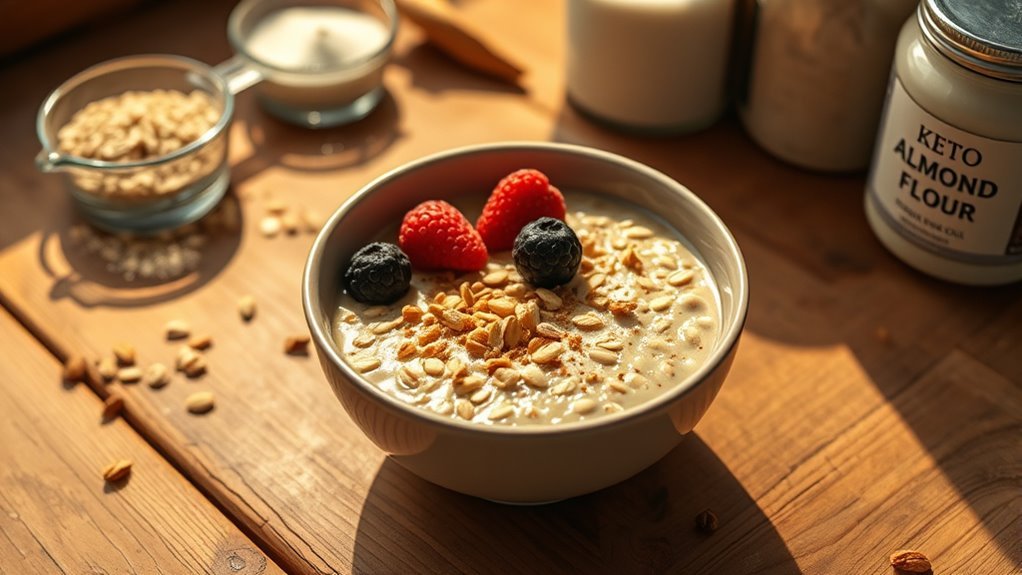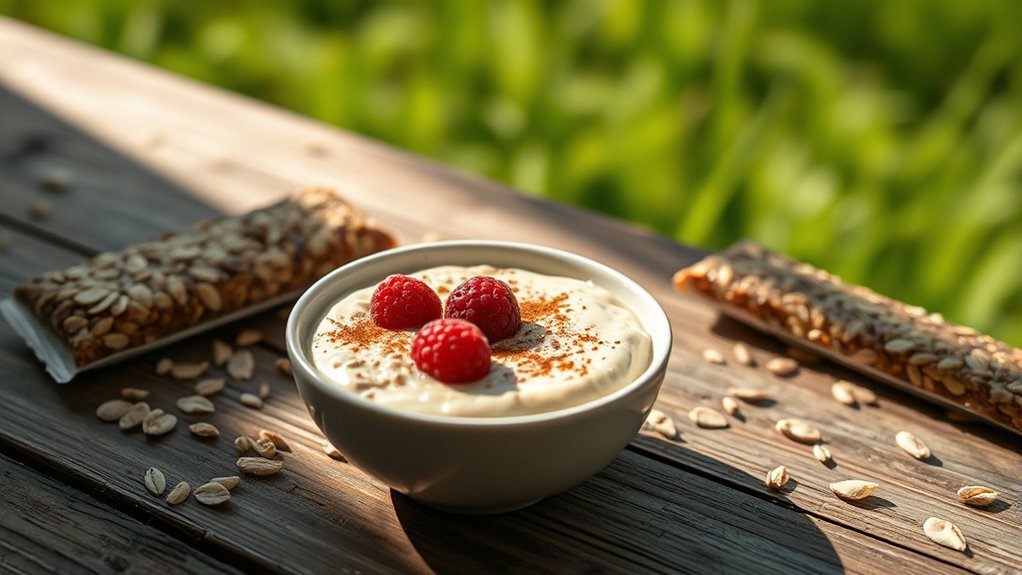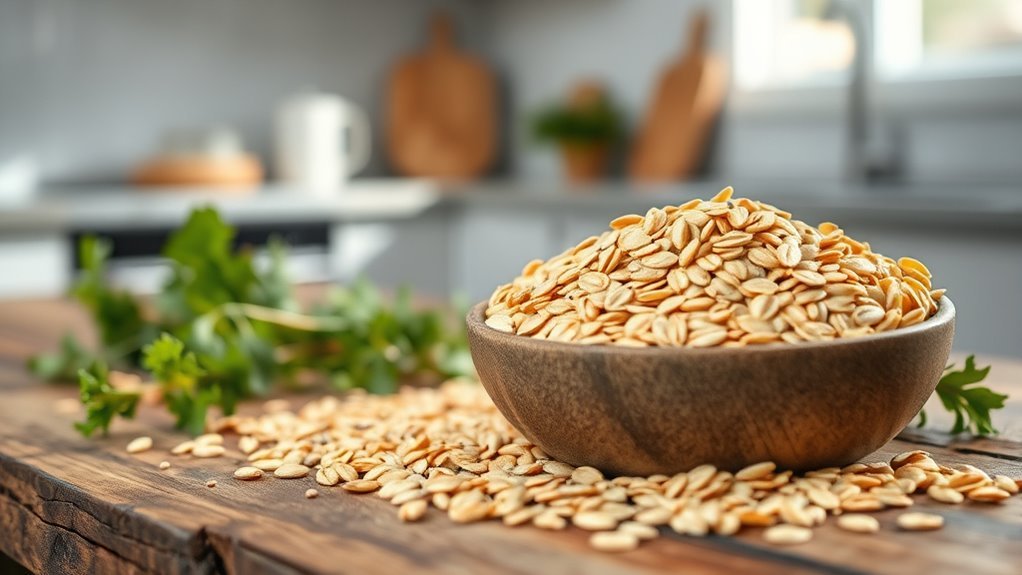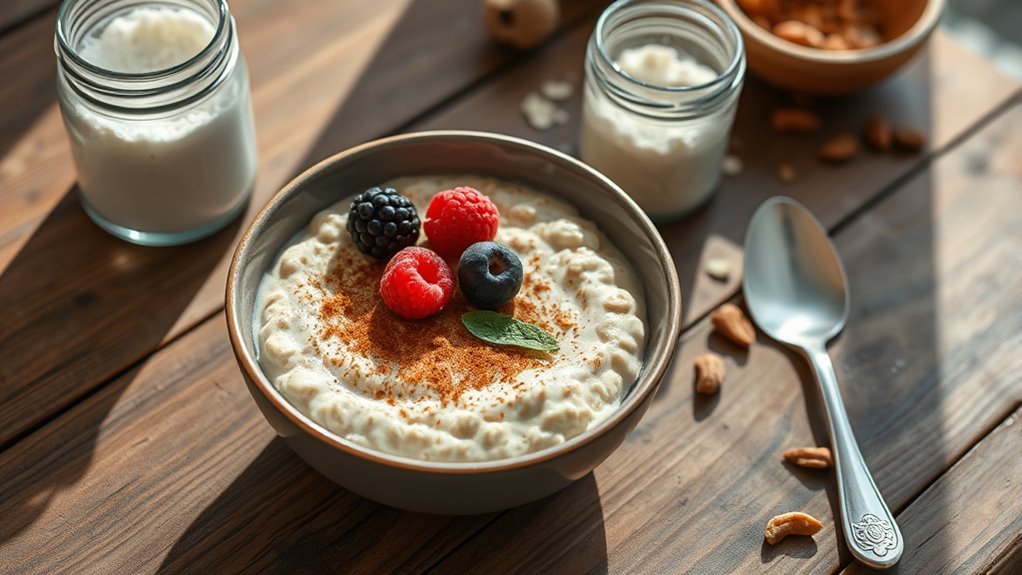Oats aren’t considered keto-friendly due to their high carbohydrate content, which can hinder your ability to stay in ketosis. With around 27 grams of carbs per 100 grams, oats can exceed your daily limits for carb intake. While they offer fiber and important nutrients, you must be cautious about portion sizes if you’re following a strict ketogenic diet. If you’re curious about how to enjoy oats while on keto, there are strategies you can explore.
Understanding the Ketogenic Diet

When you immerse yourself in the ketogenic diet, you’ll find it’s a high-fat, low-carbohydrate eating plan designed to shift your body into a state of ketosis, where it burns fat for fuel instead of carbohydrates. The core keto principles focus on considerably reducing your carb intake while increasing healthy fat consumption. This shift encourages fat adaptation, allowing your body to efficiently utilize fat stores for energy. As you adapt, you might experience improved mental clarity and sustained energy levels, giving you a newfound freedom in your food choices. However, it’s essential to monitor your macronutrient ratios and verify you’re getting enough nutrients. Embracing the ketogenic lifestyle can lead to positive changes, but individual experiences may vary, so stay informed and listen to your body. Additionally, understanding macronutrient ratios is crucial for maintaining ketosis and achieving your health goals.
Nutritional Profile of Oats

Although oats are often celebrated for their health benefits, their nutritional profile presents a challenge for those following a ketogenic diet. Oats are rich in fiber, particularly beta-glucan, which can support heart health and digestion. They also provide essential vitamins and minerals, including magnesium and iron. However, the carbohydrate content in oats can be significant, which may hinder your keto goals. If you’re looking for oats meal ideas, consider using oats in moderation, combined with low-carb ingredients like nuts or seeds. This way, you can enjoy their nutritional perks without going overboard on carbs. Ultimately, understanding oats’ nutritional profile can help you make informed choices while balancing your health goals.
Carbohydrate Content in Oats

Understanding the carbohydrate content in oats is essential for anyone considering their dietary choices, especially on a ketogenic diet. Oats come in various forms, including rolled, steel-cut, and instant, and each has a different carbohydrate profile. Generally, oats are a significant carbohydrate source, with about 27 grams of carbs per 100 grams. This could pose a challenge for those aiming to maintain ketosis, as your daily carb intake is often limited. While oats provide fiber and nutrients, they also contain starch, which can impact blood sugar levels. If you’re exploring oat varieties, it’s vital to balance your overall carbohydrate consumption to stay aligned with your keto goals. Ultimately, awareness of oat carbohydrate content helps you make informed dietary decisions. Additionally, understanding quinoa’s carbohydrate content can further help you navigate your low-carb options effectively.
Impact of Oats on Ketosis
While oats offer numerous health benefits, their impact on ketosis can be significant for those following a strict ketogenic diet. The glycemic index of oats varies, but generally, they have a moderate to high index, which means they can raise blood sugar levels. This spike may hinder your ability to maintain ketosis, as the body shifts back to burning glucose for energy. Although oats are rich in fiber and nutrients, including antioxidants, the carbohydrate content could push you over your daily limit. If you’re seeking freedom in your dietary choices, consider portion control or alternatives that align more closely with keto principles. Balancing oats’ health benefits with your nutritional goals is essential for staying in ketosis. Additionally, understanding overall carbohydrate strategy is crucial for anyone considering the inclusion of oats in their diet.
Comparing Oats With Other Breakfast Options
When considering breakfast options, it’s important to compare oats with other popular choices like eggs, avocado, and Greek yogurt. Each of these foods offers unique nutritional benefits and varying impacts on your diet, especially if you’re following a keto lifestyle. Understanding these differences can help you make informed decisions that align with your health goals.
Oats vs. Eggs
How do oats stack up against eggs in the breakfast arena? Both oats and eggs offer unique benefits, but they cater to different nutritional needs. Oats are rich in fiber, providing sustained energy and promoting digestive health. They also contain antioxidants and can help lower cholesterol levels. On the other hand, eggs are a powerhouse of protein, boasting essential amino acids and nutrients like vitamin D and choline, which support brain health. If you’re looking for a low-carb option, eggs might be your go-to. However, if you prefer a heart-healthy breakfast, oats could be your best bet. Ultimately, choosing between oats and eggs depends on your dietary goals and personal preferences, offering you freedom in your breakfast choices.
Oats vs. Avocado
Although both oats and avocado offer nutritious benefits, they serve different roles in a balanced breakfast. Oats are a great source of fiber and can provide sustained energy, while avocados bring healthy fats and a creamy texture to your morning meal. Here’s how they compare:
- Oats: High in soluble fiber, which can help lower cholesterol.
- Avocado benefits: Packed with vitamins E and C, antioxidants, and potassium, they support heart health.
- Avocado recipes: Versatile and easy to add to smoothies, toast, or salads, making them a delicious option.
Ultimately, you can enjoy both in your breakfast routine. Combining oats with avocado could be a satisfying way to start your day and fuel your freedom to explore various flavors!
Oats vs. Greek Yogurt
While oats and avocados both contribute to a nourishing breakfast, Greek yogurt is another popular choice that offers unique benefits. Let’s compare these two options to help you decide which fits your lifestyle better.
| Nutrient | Oats Benefits | Greek Yogurt |
|---|---|---|
| Protein | Moderate | High |
| Fiber | High | Moderate |
| Probiotics | None | Yes |
| Healthy Fats | Low | Moderate |
Oats are rich in fiber, promoting satiety and digestive health. Greek yogurt, on the other hand, is an excellent source of protein and probiotics, supporting gut health. Both have their merits, so it really depends on what you’re looking for in your breakfast! However, it’s important to note that the high carbohydrate content of oats can hinder ketosis for those following strict keto guidelines.
Alternative Low-Carb Grains and Seeds
If you’re seeking alternatives to traditional grains while sticking to a low-carb diet, there are several options that can fit seamlessly into your meal plan. Consider incorporating these low-carb grains and seeds:
- Quinoa: While it’s higher in carbs than some alternatives, it offers numerous quinoa benefits, including a complete protein profile.
- Chia seeds: Packed with fiber and omega-3 fatty acids, these tiny seeds are versatile and can be added to smoothies or used in puddings.
- Flaxseeds: Rich in healthy fats and fiber, flaxseeds can help keep you full and satisfied.
These options can enhance your meals without derailing your low-carb goals, providing essential nutrients and variety to your diet. Additionally, incorporating fiber-rich sources can help maintain energy levels while following a well-planned keto diet. Embrace the freedom of exploring these alternatives!
Incorporating Oats in a Keto Meal Plan
Including oats in a keto meal plan can be a bit tricky due to their higher carbohydrate content compared to other low-carb grains and seeds. However, you can still enjoy oats in moderation. Consider using small portions of steel-cut oats or oat flour in your oatmeal recipes, pairing them with low-carb ingredients like nuts or seeds to balance the carbs. You might also experiment with keto snacks that incorporate oats, such as energy balls made with nut butter and seeds, ensuring you keep your overall carb intake in check. By being mindful of portion sizes and combining oats with low-carb foods, you can add some variety to your meals without completely derailing your keto journey.
Final Thoughts on Oats and Keto
As you navigate your keto journey, it’s important to recognize that oats can be a nuanced addition to your diet. While they’re not traditionally keto-friendly due to their carb content, understanding meal timing and portion control can help you enjoy their health benefits without derailing your goals.
Consider the following:
- Balance your macros: Pair oats with high-fat toppings to maintain ketosis.
- Opt for low-carb alternatives: Explore options like chia or flax seeds for similar textures with fewer carbs.
- Mind your timing: Consuming oats earlier in the day can better support your energy needs. Additionally, incorporating low-carb options can provide satisfying alternatives without derailing your keto diet.
Ultimately, oats can fit into a keto lifestyle if you approach them thoughtfully, allowing for flexibility without sacrificing your health objectives.
Frequently Asked Questions
Can I Eat Oats Occasionally on a Keto Diet?
Yes, you can enjoy occasional oat consumption on a keto diet, but moderation’s key. Consider clever keto oat alternatives like chia seeds, flaxseeds, or almond flour to satisfy your cravings without jeopardizing your carb count. Incorporating oats occasionally might not greatly disrupt your progress, but be mindful of your overall daily intake. Balancing your meals with low-carb options can help you stay on track while still indulging in your favorite flavors.
Are All Oat Types Equally High in Carbs?
Not all oat types are equally high in carbs. Oat carbohydrate content varies, with rolled oats and instant oats typically having higher carbs compared to steel-cut oats, which may be slightly lower. However, all oats offer fiber benefits, aiding digestion and keeping you full longer. If you’re considering oats in a low-carb diet, it’s important to check the specific type and portion size to maintain your desired carbohydrate intake.
What Are Keto-Friendly Toppings for Oats?
If you’re looking for keto-friendly toppings for oats, consider using nutrient-dense options like unsweetened almond butter, chia seeds, or crushed nuts. These low carb alternatives can enhance flavor while keeping carb counts in check. You might also enjoy adding a sprinkle of cinnamon or a few berries for a touch of sweetness without derailing your diet. Remember, it’s all about balancing your toppings to fit your keto lifestyle while enjoying your meals!
How Do Oats Affect Weight Loss on Keto?
Oats can be a tricky choice if you’re aiming for weight loss on keto. Picture a bowl of creamy oats, but remember each spoonful adds to your caloric intake. While they’re packed with fiber, which helps keep you full, they also contain more carbs than many keto dieters can afford. Balancing your macros is key, so if you choose oats, guarantee they fit within your daily limits to avoid hindering your progress.
Can I Use Oats in Keto Baking Recipes?
You can use oats in keto baking, but you’ll want to be cautious. Consider oat flour alternatives like almond or coconut flour to keep your carbs low. These options can provide a similar texture without the high carbohydrate content of oats. Pairing them with low carb sweeteners, like erythritol or stevia, can help you satisfy your sweet tooth while staying within your keto goals. Enjoy the freedom to experiment with flavors and textures!
References
- https://www.healthline.com/nutrition/are-oats-keto-friendly
- https://www.medicalnewstoday.com/articles/323905
- https://www.ncbi.nlm.nih.gov/pmc/articles/PMC6009890/
- https://www.webmd.com/diet/obesity/what-is-the-keto-diet
- https://www.mayoclinic.org/healthy-lifestyle/nutrition-and-healthy-eating/in-depth/keto-diet/art-20460124
- https://www.nutrition.org.uk/healthyliving/healthyeating/keto-diet.html


